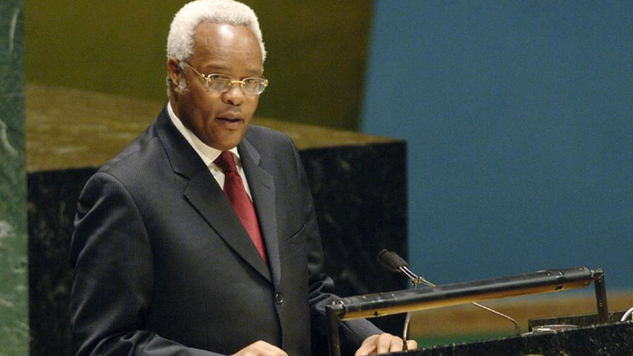
OUTGOING Tanzania president Jakaya Kikwete earlier this year urged his Burundi counterpart to observe term limits, but developments in both countries this week have backed the adage that there are only permanent interests in African politics, not foes.
A growing flurry in political posturing could slow down growth in the East African Community, as investors adopt cautious stances over the risk trajectory of the five-member market bloc of 150 million, which has been touted as an integration model for the continent.
Lowassa, Kikwete’s deep-pocketed former prime minister for three years, Wednesday decamped to the main Chadema opposition party, where he was quickly picked as its presidential candidate for the October 25 general election.
He last month failed to get the ruling Chama Cha Mapinduzi (CCM) nod for its party ticket, which is a near-guarantee of succeeding Kikwete.
CCM has dominated the country’s politics since modern Tanzania was formed, and will instead back government minister John Magufuli.
Despite positioning his switch as meant to “bring positive change” to the country, with a pledge to use Tanzania’s natural resources to develop the nation, it was the acerbic remarks Lowassa reserved for the party he had just left that suggests it will be a bruising three months for East Africa’s most populous country.
CCM’s leadership, he said, was “oppressive” and “infested with leaders who are dictators, undemocratic and surrounded with greedy power mongers.”
“CCM’s leaders have of late turned out to be undemocratic, oppressive and witch-hunting. I am no longer with them,” he added.
While breaking the CCM’ stranglehold on power may prove a tall order, his candidature will stir up a campaign that was shaping up to become a coronation for Magufuli. Still, the whiff of opportunism is in the air, for Lowassa was once an object of hatred for Chadema, who portrayed him as embodying the corruption in CCM.
However, though he is a polarising figure, he said to have well-heeled backers, giving the party some much-needed operational heft.
Ahmed Salim, a Dubai-based analyst at Teneo Intelligence, told news agency AFP this week that Lowassa would bring his new party “a lot of financial backing and grassroots support and competitiveness” in parliamentary elections.
“If he is fielded as a candidate, it changes a lot, but we can’t say it clears Chadema to win presidential elections.”
It is also not clear if Lowassa’s candidature has his new party’s full backing, as its erstwhile candidate Wilbrod Slaa has attempted to topple the CCM before and was the presumptive nominee. Party spokesman Den Lissu however said Chadema had satisfied itself that he was a strong candidate.
An outside factor is if the opposition will rally behind him, with plans of a coalition being explored, but his putative candidacy could feasibly raise political temperatures in a country praised for its stability and which has seen peaceful transfers of power since the return of multi-party politics in 1995.
In neighbouring Burundi, meanwhile, after months of criticising the country’s controversial elections, the leader of the main opposition has been picked as the deputy speaker of the loyalist-nominated parliament.
 About turn: Agathon Rwasa
About turn: Agathon Rwasa
Agathon Rwasa had described the recent win by president Pierre Nkurunziza as a “joke” and did not contest the ballot for which he had urged a boycott, where the incumbent won with 69% of the vote.
Rwasa’s name however remained on the ballot paper, winning his party 21 seats, and he has not hesitated in taking up his parliamentary seat, much to the discomfiture of his former colleagues in the opposition, who accused him of being “bought off”.
In a sign that he had sized up the landscape and decided to cut his losses, Rwasa said he would “play the game” in an attempt to bring peace in the fragile country, and the fact that the president’s ruling party voted for him suggests he may have cut a secret deal with Nkurunziza.
He has been reported as saying the decision would help make the case for new elections through a unity government, but he will have his work cut out as taking up his new job only strengthens Nkurunziza’s hand, further isolating the fledgling East African Community (EAC) mediation effort led by Uganda President Yoweri Museveni.
In Uganda, former prime minister Amama Mbabazi is looking to unseat Museveni, under who he served for three years until September 2014, when he was sacked – and nearly 40 years earlier in the bush wars, then as his intelligence chief, before he became minister in several portfolios.
Museveni’s former doctor, Kizza Besiege is also in the fray for next year’s election, as he looks to be fourth time lucky and defeat an incumbent who has been in office since 1986.
In Rwanda, the push to have president Paul Kagame seek a third term is in full swing.
The movements all promise to make the next few months politically charged for the EAC, with its risk profile likely to rise, days after US president Barack Obama flagged the region as open for business.
The Economic Commission for Africa in April said it expected the EAC to post rapid growth, increasing to 6.8% this year, from 6.5% last year, ahead of the rest of the continent.
The bloc would see its expenditures continue to exceed its budget, with deficit increasing to 3.7% of its GDP. This was a mixed bag, it said: part of it would bring future growth with Keynasian-like spending, but there was also bloated expenditure on elections and recurrent expenses, such as salaries.
In a week of political opportunism and u-turns, the fast-shifting terrain will raise concern and uncertainty over the state of East African democracy for some, while others will argue it shows pluralism is alive and healthy.


